文章详情页
SQL 嵌套查询的具体使用
浏览:127日期:2023-03-06 14:25:50
目录
- 插入数据
- select子查询(外语句先执行,内语句后执行)
- 总结
嵌套查询又称子查询,有select子查询,where子查询,from子查询,exists子查询。
插入数据
#创建表及插入记录CREATE TABLE class ( cid int(11) NOT NULL AUTO_INCREMENT, caption varchar(32) NOT NULL, PRIMARY KEY (cid)) ENGINE=InnoDB CHARSET=utf8; INSERT INTO class VALUES(1, "三年二班"), (2, "三年三班"), (3, "一年二班"), (4, "二年九班"); CREATE TABLE course( cid int(11) NOT NULL AUTO_INCREMENT, cname varchar(32) NOT NULL, teacher_id int(11) NOT NULL, PRIMARY KEY (cid), KEY fk_course_teacher (teacher_id), CONSTRAINT fk_course_teacher FOREIGN KEY (teacher_id) REFERENCES teacher (tid)) ENGINE=InnoDB DEFAULT CHARSET=utf8; INSERT INTO course VALUES(1, "生物", 1), (2, "物理", 2), (3, "体育", 3), (4, "美术", 2); CREATE TABLE score ( sid int(11) NOT NULL AUTO_INCREMENT, student_id int(11) NOT NULL, course_id int(11) NOT NULL, num int(11) NOT NULL, PRIMARY KEY (sid), KEY fk_score_student (student_id), KEY fk_score_course (course_id), CONSTRAINT fk_score_course FOREIGN KEY (course_id) REFERENCES course (cid), CONSTRAINT fk_score_student FOREIGN KEY (student_id) REFERENCES student(sid)) ENGINE=InnoDB DEFAULT CHARSET=utf8; INSERT INTO score VALUES(1, 1, 1, 10),(2, 1, 2, 9),(5, 1, 4, 66),(6, 2, 1, 8),(8, 2, 3, 68),(9, 2, 4, 99),(10, 3, 1, 77),(11, 3, 2, 66),(12, 3, 3, 87),(13, 3, 4, 99),(14, 4, 1, 79),(15, 4, 2, 11),(16, 4, 3, 67),(17, 4, 4, 100),(18, 5, 1, 79),(19, 5, 2, 11),(20, 5, 3, 67),(21, 5, 4, 100),(22, 6, 1, 9),(23, 6, 2, 100),(24, 6, 3, 67),(25, 6, 4, 100),(26, 7, 1, 9),(27, 7, 2, 100),(28, 7, 3, 67),(29, 7, 4, 88),(30, 8, 1, 9),(31, 8, 2, 100),(32, 8, 3, 67),(33, 8, 4, 88),(34, 9, 1, 91),(35, 9, 2, 88),(36, 9, 3, 67),(37, 9, 4, 22),(38, 10, 1, 90),(39, 10, 2, 77),(40, 10, 3, 43),(41, 10, 4, 87),(42, 11, 1, 90),(43, 11, 2, 77),(44, 11, 3, 43),(45, 11, 4, 87),(46, 12, 1, 90),(47, 12, 2, 77),(48, 12, 3, 43),(49, 12, 4, 87),(52, 13, 3, 87); CREATE TABLE student( sid int(11) NOT NULL AUTO_INCREMENT, gender char(1) NOT NULL, class_id int(11) NOT NULL, sname varchar(32) NOT NULL, PRIMARY KEY (sid), KEY fk_class (class_id), CONSTRAINT fk_class FOREIGN KEY (class_id) REFERENCES class (cid)) ENGINE=InnoDB DEFAULT CHARSET=utf8; INSERT INTO student VALUES(1, "男", 1, "理解"), (2, "女", 1, "钢蛋"), (3, "男", 1, "张三"), (4, "男", 1, "张一"), (5, "女", 1, "张二"), (6, "男", 1, "张四"), (7, "女", 2, "铁锤"), (8, "男", 2, "李三"), (9, "男", 2, "李一"), (10, "女", 2, "李二"), (11, "男", 2, "李四"), (12, "女", 3, "如花"), (13, "男", 3, "刘三"), (14, "男", 3, "刘一"), (15, "女", 3, "刘二"), (16, "男", 3, "刘四") CREATE TABLE teacher( tid int(11) NOT NULL AUTO_INCREMENT, tname varchar(32) NOT NULL, PRIMARY KEY (tid)) ENGINE=InnoDB DEFAULT CHARSET=utf8; INSERT INTO teacher VALUES(1, "张磊老师"), (2, "李平老师"), (3, "刘海燕老师"), (4, "朱云海老师"), (5, "李杰老师");
select子查询(外语句先执行,内语句后执行)
例1. 查询课程名并显示课程老师的名称
select * from course c where c.teacher_id="1"; select * from teacher t where t.tid="1"; -- 最后拼接select * ,(select tname from teacher t where t.tid=c.teacher_id)name from course c;
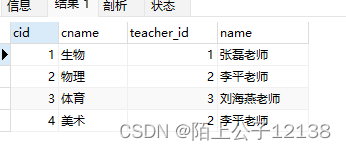
where 子查询(先执行子查询,再执行外查询)
例2.查询学习了体育的学生
-- 选择了体育学生的idselect sc.student_id from course co left join score sc on co.cid=sc.course_id where cname="体育"-- 通过学生表用学生id匹配学生姓名select st.sname from student st where st.sid in(select sc.student_id from course co left join score sc on co.cid=sc.course_id where cname="体育")
部分结果:
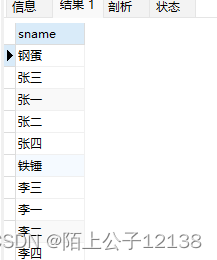
from 子查询(先执行子查询,再执行外查询)
例3.列出三年二班学了体育的学生
select a.* from (select st.sname,cl.caption from score sc left join course co on sc.course_id=co.cidleft join student st on st.sid=sc.student_idleft join class cl on cl.cid=st.class_idwhere co.cname="体育")a where a.caption="三年二班";
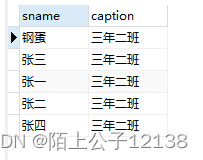
exists 子查询
(先执行外语句,再执行子查询,根据子查询返回结果判断是否保留外查询结果)
例4.查询学了课程di为1的学生的姓名
select * from student st where exists(select *from score sc where course_id="1" and sc.student_id=st.sid);
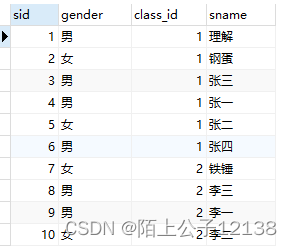
总结
sql查询本质就是对各种表进行裁剪和拼接,最后得到我们想要的数据。
所有的能通过子查询完成的查询都能用连接查询完成,如例1:查询课程名并显示课程老师的名称
select *from course coleft join teacher te on te.tid=co.teacher_id;
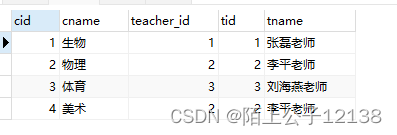
所以要灵活运用查询方式,才能更高效的查询。
到此这篇关于SQL 嵌套查询的具体使用的文章就介绍到这了,更多相关SQL 嵌套查询内容请搜索以前的文章或继续浏览下面的相关文章希望大家以后多多支持!
标签:
MsSQL
相关文章:
排行榜

 网公网安备
网公网安备